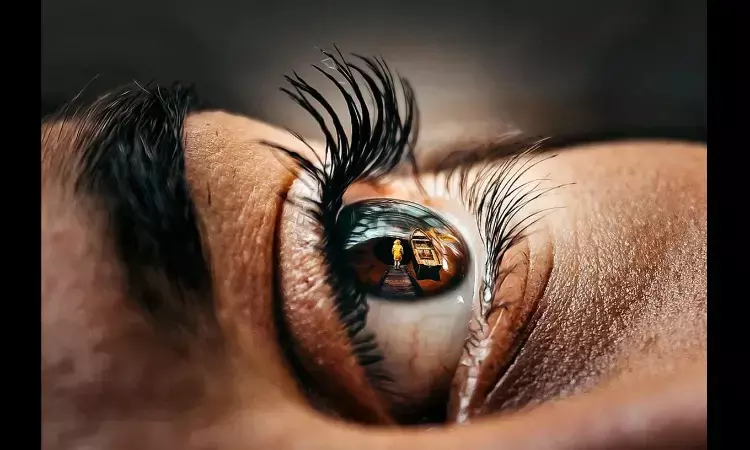- Home
- Medical news & Guidelines
- Anesthesiology
- Cardiology and CTVS
- Critical Care
- Dentistry
- Dermatology
- Diabetes and Endocrinology
- ENT
- Gastroenterology
- Medicine
- Nephrology
- Neurology
- Obstretics-Gynaecology
- Oncology
- Ophthalmology
- Orthopaedics
- Pediatrics-Neonatology
- Psychiatry
- Pulmonology
- Radiology
- Surgery
- Urology
- Laboratory Medicine
- Diet
- Nursing
- Paramedical
- Physiotherapy
- Health news
- Fact Check
- Bone Health Fact Check
- Brain Health Fact Check
- Cancer Related Fact Check
- Child Care Fact Check
- Dental and oral health fact check
- Diabetes and metabolic health fact check
- Diet and Nutrition Fact Check
- Eye and ENT Care Fact Check
- Fitness fact check
- Gut health fact check
- Heart health fact check
- Kidney health fact check
- Medical education fact check
- Men's health fact check
- Respiratory fact check
- Skin and hair care fact check
- Vaccine and Immunization fact check
- Women's health fact check
- AYUSH
- State News
- Andaman and Nicobar Islands
- Andhra Pradesh
- Arunachal Pradesh
- Assam
- Bihar
- Chandigarh
- Chattisgarh
- Dadra and Nagar Haveli
- Daman and Diu
- Delhi
- Goa
- Gujarat
- Haryana
- Himachal Pradesh
- Jammu & Kashmir
- Jharkhand
- Karnataka
- Kerala
- Ladakh
- Lakshadweep
- Madhya Pradesh
- Maharashtra
- Manipur
- Meghalaya
- Mizoram
- Nagaland
- Odisha
- Puducherry
- Punjab
- Rajasthan
- Sikkim
- Tamil Nadu
- Telangana
- Tripura
- Uttar Pradesh
- Uttrakhand
- West Bengal
- Medical Education
- Industry
Mental stress may affect intraocular pressure and visual field testing

In a new study conducted by Shay Keren and team, it was found that following a brief mental stress test, there was a minor but statistically significant increase in intraocular pressure (IOP) and a tendency toward worsening visual field mean deviation. The alterations were more significant in patients with more severe glaucoma.
The findings of this study were published in Graefe's Archive for Clinical and Experimental Ophthalmology.
The goal of this study was to see how a mental stress stimulus affected intraocular pressure (IOP) measurement and visual field (VF) assessment. Patients with open angle glaucoma had their IOP measured and their VF tested at the start of the study. They then underwent a computerized mental stress test (Stroop test), which is a well-established standardized approach for inducing mental stress. Patients were given a second IOP measurement and VF testing once the test was completed.
The key findings of this study were as follow:
1. A total of 72 eyes from 36 participants were included in the study.
2. The average age was 67.0 9.5 years (range 47–84). IOP was 15.0 mmHg at baseline, and it increased to 16.0 mmHg following the Stroop mental stress test (P 0.001).
3. Following the stress test, there was a trend for significant mean deviation to decrease from -6.9 dB to -8.0 dB (P = 0.054, t-test).
4. Using the Wilcoxon nonparametric test, this difference became significant (P = 0.008). Glaucoma severity was shown to be correlated with changes in IOP (P = 0.02) and PSD (P 0.01).
5. There were no differences in study parameters in response to stress in patients taking different medication classes in a sub-analysis by medication classes.
In conclusion, this research demonstrates that a standardized mental stress test could lead to a minor but statistically significant increase in IOP. Patients who experience anxiety or stress before to IOP examination in the physician's office may experience a little increase in IOP, which could be related to stress, similar to white coat syndrome in blood pressure examination patients. Furthermore, stress was linked to a worsening of VF testing findings, and this phenomena and its reasons should be investigated further in larger research in the future.
Reference:
Keren, S., Waisbourd, M., Gomel, N. et al. Influence of mental stress on intraocular pressure and visual field testing: is there a white coat syndrome in glaucoma?. Graefes Arch Clin Exp Ophthalmol 260, 209–214 (2022). https://doi.org/10.1007/s00417-021-05315-9
Medical Dialogues consists of a team of passionate medical/scientific writers, led by doctors and healthcare researchers. Our team efforts to bring you updated and timely news about the important happenings of the medical and healthcare sector. Our editorial team can be reached at editorial@medicaldialogues.in.
Dr Kamal Kant Kohli-MBBS, DTCD- a chest specialist with more than 30 years of practice and a flair for writing clinical articles, Dr Kamal Kant Kohli joined Medical Dialogues as a Chief Editor of Medical News. Besides writing articles, as an editor, he proofreads and verifies all the medical content published on Medical Dialogues including those coming from journals, studies,medical conferences,guidelines etc. Email: drkohli@medicaldialogues.in. Contact no. 011-43720751


